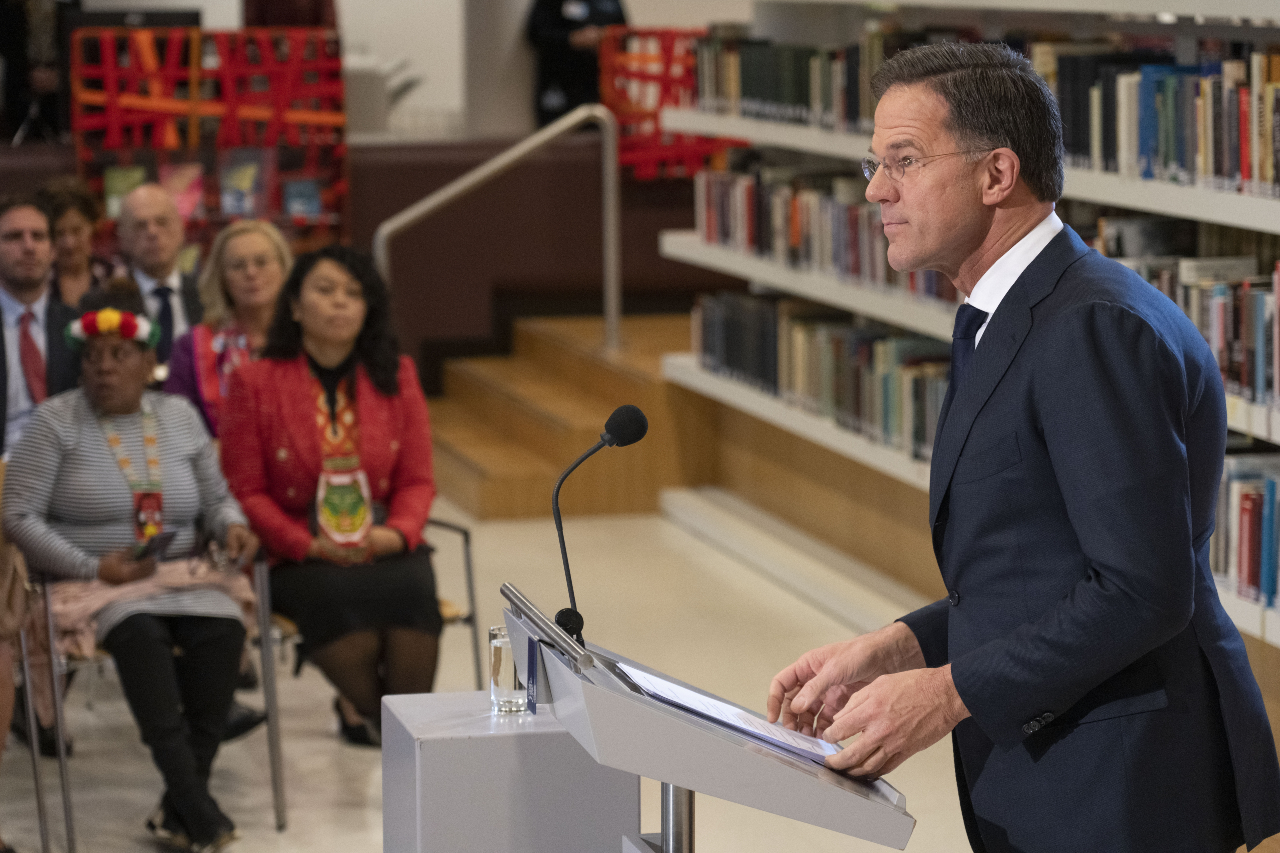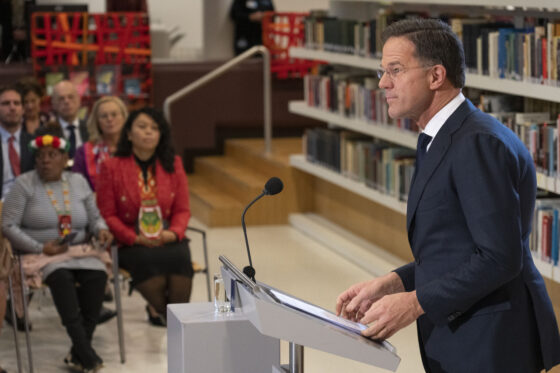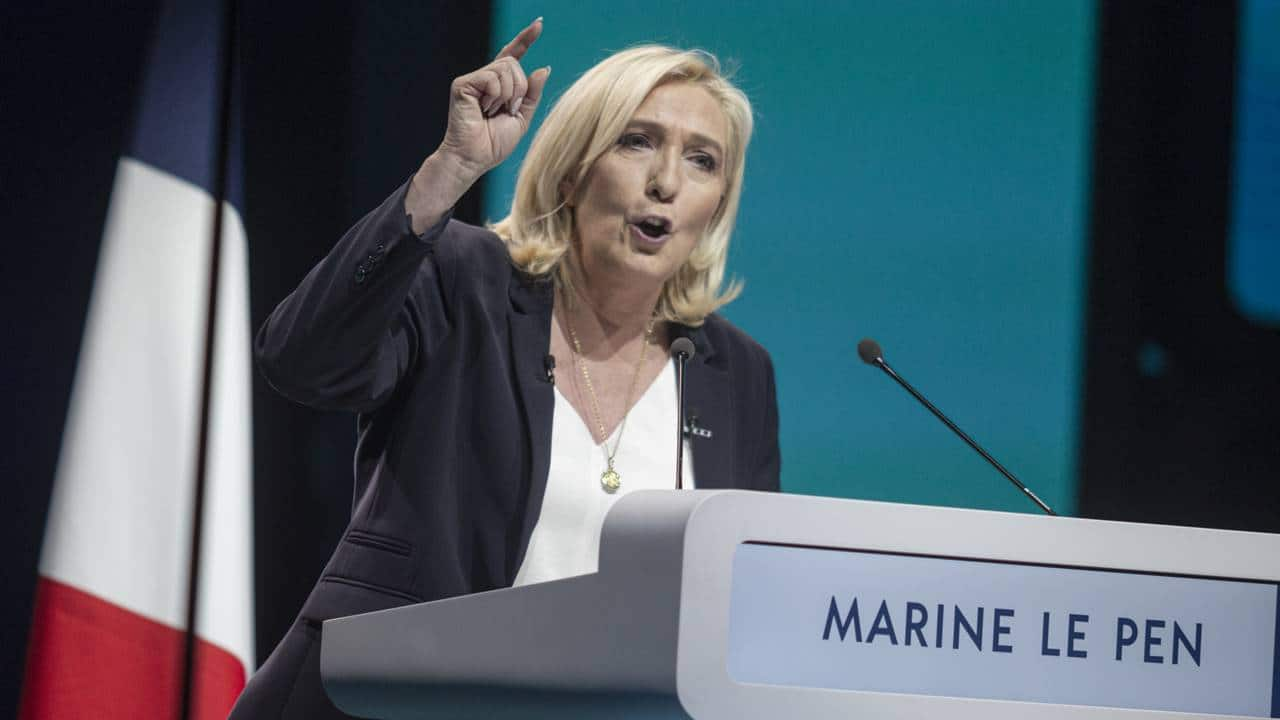Rutte apologizes for slave trade, ‘human dignity was trampled’


Mark Rutte issued an apology at the National Archives.Photo: ANP/Peter DeJon
Prime Minister Mark Rutte has officially apologized for the Netherlands’ past slave trade. The speech had been criticized in advance for being arranged hastily and delivered without consulting the descendants of the victims.
Speaking at the National Archives in The Hague, Rutte said he was apologizing “for the actions of the Dutch state in the past” during the 200 years of being transported as slaves from Africa to the Dutch colonies in the Caribbean.
Rutte said he apologized “to all those who were enslaved after his death and suffered by that act throughout the world, their sons and daughters, and all their descendants to this day.”
The speech was preceded by controversy over the government’s plan to apologize on 19 December. Anti-slavery activists said they hoped the apology would take place next July 1, the 150th anniversary of the abolition of slavery in Suriname, an event known as Ketty. Coty (“Breaking the Chains”).
A group of six organizations appeared in court last week to try to force the government to delay the announcement until July 1, claiming ministers failed in their duty to protect citizens from harm, but the judge said: political issues and refused to intervene.
Activists also criticized the Cabinet’s plan to send seven ministers to Suriname and the Dutch Caribbean islands to present an apology, particularly the choice of Fran Wehrwind, the Minister of Legal Protection who has a family from Suriname. criticized the
national memory
Rutte said the National Archives was chosen as the venue for the speech because it is a place of “national memory” and a potential “national examination of our consciences”. Stated.
“For centuries, the Dutch state and its representatives have promoted, stimulated, maintained and benefited from slavery,” he said.
“For centuries people have been commoditized, exploited and abused in the name of the Dutch state. , has been trampled in the most gruesome way.
And successive Dutch governments since 1863 have done little to recognize and appreciate the negative effects of the past slave trade. On behalf of the Dutch government, I would like to apologize for this.
anniversary year
Rutte repeated his apology in English, Suranantongo, a Surinamese language, and Papiamento, spoken in the Dutch Caribbean.
Rutte also clarified that apologizing for slavery is not an attempt to “clean the deck”, but encourages a broader discussion of the past slave trade and its implications.
The government will develop a program of events throughout 2023 to mark the 150th anniversary of the abolition of slavery. Rutte also confirmed that King Willem-Alexander will attend the official commemoration of Ketty Coty in Amsterdam on July 1.
The speech coincided with the announcement of a €200 million fund to subsidize projects focusing on the history of the Atlantic slave trade. Descendants of enslaved people will also be able to change their names free of charge under temporary regulations.
“comma, not period”
“We are doing this to find a way to move forward together as we stand on the threshold of a momentous year,” Rutte said.
“We share not only the past but also the future. Today I put a comma instead of a period.
Until the speech, it was unclear whether the prime minister would even apologize. Deputy Prime Minister Sigrid Kaag flew to Paramaribo last Thursday to address complaints that the former colony had no say in plans to apologize for slavery.
Rutte admitted that his preparation for the day “could have been better”, but went on to say, “Let’s not let that be an excuse not to do anything. We will move forward together and try to make progress together.” is needed.
He said he was aware of the Dutch state’s “historic responsibility” for the slave trade, but added that “there was no right moment for anyone to apologize.”
personal mistake
Rutte said the history of slavery has received more attention in recent years and that there has been a heightened “social awareness”, prompting a change in people’s mindset that he personally experienced.
“For a long time I thought it was impossible to take responsibility in a meaningful way for something that happened a long time ago in which none of us were personally involved.
For a long time, I really thought our slave trade past was the history behind us. Centuries of oppression and exploitation still have a legacy today in racist stereotypes, discriminatory patterns of exclusion, and social inequality.
reaction
Kathleen Ferrier, president of the Netherlands’ UNESCO Commission, told broadcaster NOS in response that the apology was a “historic moment”.
“I have seen the Prime Minister recognizing the facts that characterize the history of slavery. He is looking to the future.He also recognized the importance of spirituality.It really affected me.I saw an audience that was moved but there was no applause. I was right.
Jerry Afriyie, founder of Kick Out Zwarte Piet, said Rutte’s words were “right, but we need to do the right thing.”
Thank you for donating to DutchNews.nl
The DutchNews.nl team would like to thank all of our generous readers who have donated in recent weeks. Your financial support has allowed us to extend our coverage of the coronavirus crisis into evenings and weekends, keeping you up to date with the latest developments.
DutchNews.nl has been free for 14 years. Your contribution makes this possible.
https://www.dutchnews.nl/news/2022/12/rutte-apologises-for-slave-trade-human-dignity-was-trampled-underfoot/ Rutte apologizes for slave trade, ‘human dignity was trampled’





